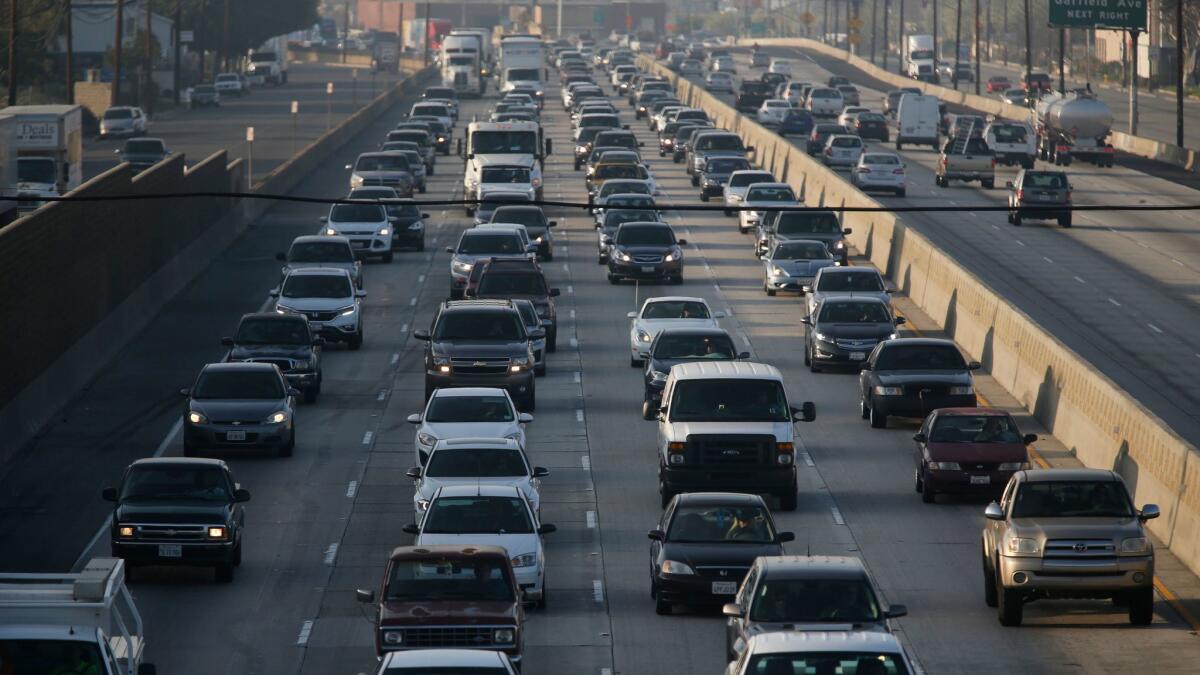Automakers and Trump face new pressure not to ease mileage rules

Environmentalists and consumer advocacy groups are castigating automakers for supporting the Trump administration’s effort to relax fuel-economy standards amid fresh warnings from a Democratic leader that the plan won’t deliver promised safety benefits and will raise costs for consumers.
Sen. Thomas R. Carper (D-Del.) said the administration’s latest draft plan for fuel economy and greenhouse gas standards for autos, which is now being reviewed by the White House, fails to deliver many of the benefits promised when it was initially proposed in 2018. Although the Trump administration backed off from a harsher initial plan that would have frozen requirements for six years, Carper said the new approach — built on a 1.5% annual increase in the stringency of the mandates — may be even worse.
“The SAFE vehicles rule, if finalized in its present form, will lead to vehicles that are neither safer, nor more affordable or fuel efficient,” Carper said in a letter late Wednesday to the head of the Office of Information and Regulatory Affairs, which is examining the proposal.
Carper’s missive comes amid a broad pressure campaign against the Trump administration’s vehicle plan — which has yet to be released — and the automakers that have endorsed part of it. On Thursday, newspapers in Sacramento, Washington and Detroit published an advertisement containing an open letter by environmental groups calling out Toyota Motor Corp., General Motors Co., Fiat Chrysler Automobiles and other car makers.
Those companies backed the Trump administration in lawsuits that challenged its decision to strip California’s authority to set tougher greenhouse gas emissions rules than federal regulators, a key element in President Trump’s sweeping plan to reshape auto-efficiency rules.
“We should be producing the cars of the future, not ceding the clean-car market to other countries,” Gina McCarthy, president of the Natural Resources Defense Council and an Environmental Protection Agency administrator under President Obama, said in a news release announcing the letter. “It’s unacceptable for these auto executives to side with President Trump as he works to endanger the health and welfare of millions of Americans.”
Separately, Consumer Reports on Wednesday sent a petition signed by 75,000 people urging those automakers to drop their support. And on the sidelines of an annual auto industry show in Washington, religious leaders were scheduled to pray for automakers, asking that they consider the “moral implications” of the administration’s fuel standards policy, according to groups organizing the opposition.
Carper based his arguments on a copy of the draft final rule he said his office obtained from a person outside the government. His letter was previously reported by the Washington Post.
The rule as submitted to the White House would impose net costs rather than the benefits claimed in the 2018 proposal: net costs of $34.4 billion to $41.3 billion over the lifetime of vehicles produced under the Trump standards, which “would seem to fly in the face of rational rulemaking,” Carper wrote.
By contrast, the Trump administration has argued that easing mileage standards would reduce vehicle prices and make it easier for people to replace older, less efficient cars with new ones that are more efficient and safer.
The draft final rule finds that a 1.5% per year increase in fleet mileage requirements through 2026 would cut vehicle prices by roughly $1,000 but would also result in consumers spending more than $1,400 on additional fuel, Carper said.
While the earlier 2018 proposal projected that thousands of highway fatalities would be eliminated, the draft final rule projected just 471 lives would be saved under the weaker standards through 2029, Carper wrote.
“I urge you to require EPA and [the Department of Transportation] to abandon these efforts entirely,” or “at a minimum” require the agencies to make wholesale revisions to the rule before it is finalized, Carper wrote.
He said the draft “utterly fails to provide any demonstrable safety, environmental or economic benefit to consumers or the country.”






